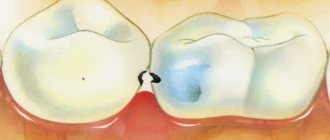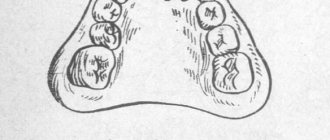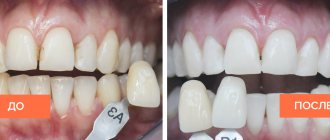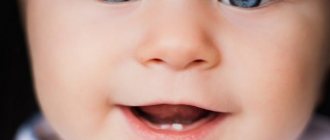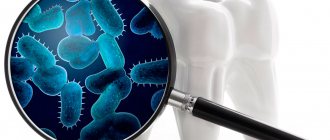Are babies born with teeth? As a rule, children’s first teeth begin to appear after they reach six months of age, but in medical practice there are often cases of children being born with teeth. Such deviations from the norm are much more common in girls than in boys.
According to statistics, no more than 2000 such cases are diagnosed annually, so when teeth are identified in a newborn, medical personnel are surprised, and parents worry about their child. Today we will try to figure out what this deviation is connected with, what it entails and what to do in this case.
Newborn girl with teeth.
Why was the child born with teeth?
If a child is born with a tooth in his mouth, what does this mean? This is the question that modern doctors and parents ask when they discover teeth in a newborn baby. Most often this phenomenon is associated with:
- the content of calcium and vitamin D in a woman’s body during pregnancy;
- superficial location of the primary sources of teeth;
- infectious diseases in a severe stage of a pregnant woman, accompanied by an increase in body temperature;
- various congenital pathologies and ailments;
- taking certain medications in the first three months of pregnancy, when the effect on the fetus is most significant;
- endocrine disorders and hormonal imbalances in the maternal body;
- genetic predisposition;
- environmental features
Important! The formation of tooth primordia occurs during the development of the child in the mother’s womb.
In this regard, it must be remembered that the nutrition and lifestyle of a woman during pregnancy have a direct impact on the development of the baby . If a child is born with teeth, genetic testing will most likely be ordered. This will allow us to determine the reasons for the development of natal teeth.
Child with Sotos syndrome.
What types of teeth do children have at birth?
The teeth found in the oral cavity of a newborn child may be complete or spare. Regardless of the variety, such teeth are characterized by inferior structure, softness, weakness and rapid wear.
Depending on the variety, “early” teeth also have certain characteristics:
- The eruption of complete teeth
occurs during the baby’s intrauterine development. Their main drawback is represented by the weakness of the structure. These bone structures deteriorate and wear down very quickly and most often fall out before the child reaches the age of four, causing a lot of inconvenience to caring parents and the child. The main inconveniences are associated with the inability to ensure normal breastfeeding of the child, because the woman will constantly face injury to her nipples. Sharp teeth in a child’s mouth can also be the cause of regular disruption of the integrity of soft tissues, accompanied by the formation of ulcers and wounds. - Spare teeth
are represented by an additional row of milk teeth, the formation and eruption of which also occurs during intrauterine development. Most often, spare teeth fall out soon after the baby is born, but they can also remain for a long period. In this case, they most often resort to removing these teeth so that a full-fledged dentition can be formed. Spare teeth also cause a lot of inconvenience, limiting normal feeding and causing many wounds and ulcers in the baby’s mouth.
Should I worry?
If a child was born with a tooth, what does this mean and whether this deviation poses a danger, only a specialist can tell after a comprehensive examination, the need for which is due to the fact that the phenomenon is often associated with dangerous syndromes, represented by:
- Ellis-Van Creveld syndrome - a very rare genetic disease that affects the growth of bone structures;
- Hallerman-Streiff syndrome - maxillofacial dysmorphia;
- craniofacial synostosis, in which early closure of the sutures of the skull occurs, which makes it limited and deformed (this pathology is most often diagnosed among boys);
- multiple steatocystoma - a benign disease accompanied by the development of numerous cystic skin nodules;
- congenital form of pachyonychia, characterized by damage to the nail plates, their compaction and the appearance of longitudinal grooves;
- Sotos syndrome - a congenital disease characterized by tall stature, convexity of the frontal lobe of the skull and accelerated development of bone tissue;
- Robin's anomaly - a congenital defect characterized by inadequate development of the lower jaw and recessed tongue;
- cleft palate - a congenital pathology in which the halves of the palate do not fuse (in society the anomaly is called a cleft palate).
Attention! When identifying teeth in a newborn, you should not immediately panic, because the likelihood that the deviation is associated with one of the listed pathologies is very small.
The baby should be shown to the dentist even if the first milk teeth erupt in the first month after birth . Ignoring the situation is fraught with disturbances in the development of the jaw and facial skeleton as a whole.
A child chews on a teething rattle.
Popular beliefs
The first tooth erupts sooner or later.
- This happens early, before 4 months - soon the baby’s mother will become pregnant.
- He erupted late - indicating the extraordinary talent of the little man. It was believed that the baby would have a rare gift.
- How many baby teeth appear by the age of 1 year, the number of brothers and sisters he will have.
We invite you to familiarize yourself with Braces health and beauty
It was important which tooth erupted first.
- Any top one means a brother will be born soon, if the bottom one is a sister.
- Almost simultaneously, two upper teeth appeared and a gap between them - a good warning. According to ancient signs about children, he will be lucky and will have many partners.
It happens that babies are born with baby teeth. In ancient times, people were afraid of such children and believed that sooner or later they would turn into minions of black forces. Modern medicine explains this phenomenon by genetic predisposition.
- Rare teeth - a dreamer, will lie.
- Frequent - he will become amorous.
- A daughter/son grinds his teeth - he is being attacked by demons, there is negative energy around him that needs to be gotten rid of. Now it's for worms.
- Teeth take a very long time to come out - the child will be lazy, capricious, and as an adult he will be prone to melancholy.
- If the teeth appear wide and elongated, the baby will be kind and happy.
- Short and thin - will be greedy.
Do these teeth need to be removed?
The decision on what to do with baby teeth that appear ahead of schedule should be made only by a qualified specialist after research, one of which is a clinical examination of the baby’s oral cavity.
The diagnostic method includes:
- External examination of teeth to determine their mobility, shade and shape. More detailed information can also be obtained through radiographic examination. In the case of missing roots, the decision is most often made to remove the tooth. This is necessary to prevent it from entering the respiratory tract of a newborn baby after a sudden loss.
- Studying the condition of the soft tissues of the tongue and gums to identify possible damage from the sharp tips of the teeth, granulomatous lesions and inflammatory processes in the oral cavity.
- Prescribing tests, conducting consultations with specialists, performing diagnostic studies that will help eliminate dangerous causes of the anomaly.
All the results are combined and will help you make a decision regarding the removal or preservation of early teeth and the treatment of associated pathologies. It is impossible to identify a single tactic for the behavior of specialists in relation to such teeth.
Important! Some dentists recommend getting rid of such bone formations, guided by their underdevelopment, weakness, difficulties in ensuring breastfeeding, and the high risk of soft tissue injury, accompanied by inflammatory processes in the oral cavity.
At the same time, a number of specialists insist on surgical interventions only for spare teeth. After removing the reserve row of bone formations that formed in the oral cavity during intrauterine development, healthy milk teeth can emerge in their place in time, which will perfectly cope with their assigned functions until the permanent ones appear.
But the removal of complete teeth risks the fact that the child will lack the necessary bone formations until permanent teeth with root systems appear. , there is a possibility of encountering an abnormal jaw structure, displacement of baby teeth, etc.
Most often, difficulties in determining the further fate of such teeth are associated with the inability to correctly determine their type. Often in such cases, fluoroscopy may be prescribed, but many parents refuse such medical measures due to the high danger for the child. As medical practice shows, only in 5% of cases teeth are spare. In all other cases we are talking about complete teeth.
On a minor note
True, not all signs associated with the first tooth are so rosy. There are also the exact opposite. For example, it is believed that if the first teeth grow slowly, painfully and cause big problems for a little man, then this indicates that he will grow up with a quarrelsome character, will be grumpy and intractable.
We invite you to familiarize yourself with the Anatomy of the oral cavity. Lips. Oral mucosa. Floor of the mouth.
By the way, this sign is completely connected with real psychology - if a child suffers from teething for a long time, parents will try to compensate for his suffering with gifts, toys and other pleasant things, thanks to which he can get used to it and grow up to be an excessive egoist.
It is also considered a rather bad omen if a baby’s fang erupts first. Such children were often considered dysfunctional, associated with evil spirits, and all sorts of suffering and even death at a young age were predicted for them.
In some countries, for example, Africa, a woman who gave birth to such a child could even be kicked out of the village so that she would not bring misfortune and God's punishment on its inhabitants.
Doctor Komarovsky's opinion
Dr. Komarovsky is also studying the question of whether a child can be born with teeth, who notes that deviations of 6 months in the established time frame, both upward and downward, are considered an acceptable norm.
However, the specialist insists on a mandatory visit to the dentist if teething is very late and there is an uncharacteristic localization of developing baby teeth. The doctor also considers the appearance of teeth before birth to be situations that require additional study.
Important! All of the above deviations may be associated with dangerous pathological processes in the baby’s developing body, and therefore should not be left without due attention. Only a specialist will be able to exclude dangerous deviations and prescribe timely and effective treatment, if necessary.
Now you know for sure whether children are born with teeth and what this may be connected with, but if such an anomaly is identified, you should not worry, because most often it is a minor deviation from the norm that can be easily corrected.
Folk signs
There is a popular belief that if a newly born child has teeth, it means that he is endowed by nature with good health. It is also believed that early incisors are a sign of happiness and a comfortable life. Such children will grow up brave and can always respond to offenders. It is known for certain that Napoleon Bonaparte was one of these children, and in those days this was considered a great success.
According to other signs, the life of “toothy” babies is not so rosy. They will be haunted by failures in life and will have poor health. Following superstition, in order to protect the child from trouble, these teeth are removed and a special ritual is performed.
Parents do not need to worry if the baby is born with teeth. This phenomenon has been well studied in medicine, and in itself is not dangerous. In fact, a child’s health is influenced not by the presence or absence of teeth at birth, but by how he eats, in what atmosphere and care he grows up.
The video provides additional information on the topic of the article.







